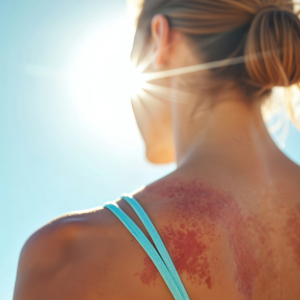Why Your Eczema Might Flare Up This Summer

When you think of eczema, a lot of people think of the dry and scratchy skin that comes in the wintertime. But now, it’s the height of summer, and your symptoms are causing you a bunch of irritation and dread. Here are a few reasons you may be experiencing an eczema flare up, and what you can do to relieve your symptoms.
Direct Contact with Allergens

Laying in the grass or jumping in the pool can cause a skin disaster for those with allergies. Here are a few things you may be touching that cause eczema:
- Environmental allergies like grass and trees
- Pollen (the inevitable layers on your outdoor chairs or tables)
- Irritants like chlorine
- It’s best to “over-think” in these situations – put down a blanket before sitting down on the grass, wipe down pollen-covered surfaces, and avoid chlorine if it causes issues.
Summer Products
Certain products are used more frequently in the summertime, especially for those who don’t experience warm weather year-round. You may have more rashes or itching when introducing new products like:
- Sunscreen
- Bug sprays
- SPF skincare products
Since ingredients can change often, the product you bought last year that was “skin safe” may have changed. Be sure to always check labels for ingredients that could cause flare ups.
Drying Factors
Eczema is often viewed as worse in the winter because of the cold and dry conditions, but there are a lot of factors that cause drying in the summer, too. Think of things like:
- Air conditioning
- Sun exposure
- Dehydration
These can all cause an increase in skin symptoms. Be sure to continue to use a safe moisturizer consistently to help keep your skin barrier strong.
Treating the Cause of Eczema
No matter your level of diligence, flare ups can happen. The only way to truly prevent symptoms of allergic eczema is to treat the underlying allergy for good.
Immunotherapy is the only disease-modifying option for treating allergies, and it can help with related conditions like eczema, too. With custom sublingual immunotherapy following the La Crosse Method™ Protocol, patients are slowly and safely introduced to the allergens that cause their symptoms. Over time, the body learns not to react when exposed, and symptoms are reduced or eliminated.
If your eczema is allergy related, allergy drops may be a great option for feeling great all year round. Find a provider near you for allergy testing and custom treatment.

